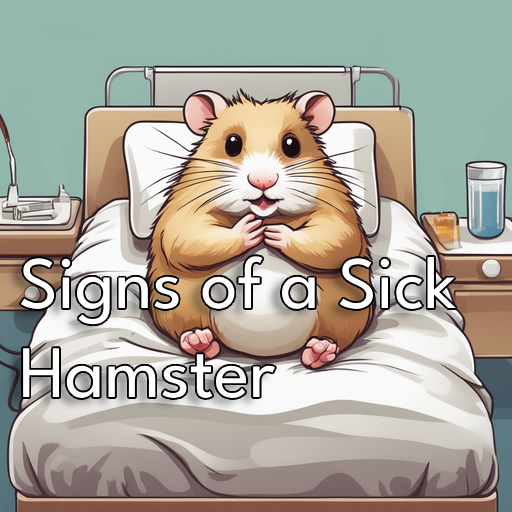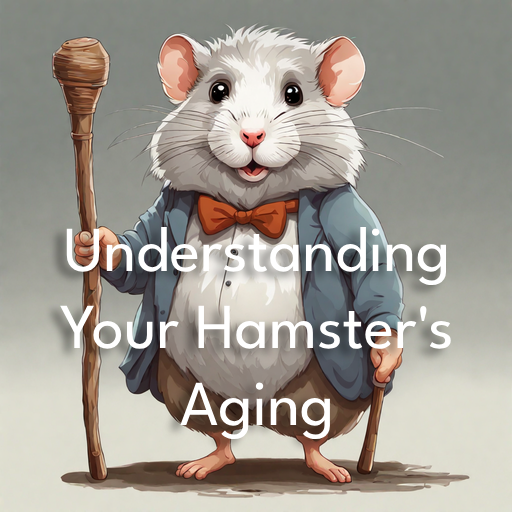Hamsters, with their adorable antics and tiny paws, bring immense joy and love to our lives. However, like all living creatures, hamsters can sometimes fall ill. Recognizing when your hamster is unwell, understanding common illnesses, and knowing how to care for a sick hamster are crucial aspects of responsible pet ownership. In this comprehensive guide, we’ll explore hamster sickness in detail, ensuring that you are well-prepared to provide the best care for your beloved furry friend.
Signs of a Sick Hamster
The first step in caring for a sick hamster is recognizing the signs of illness. Hamsters are excellent at hiding their symptoms, so paying close attention to their behavior and physical condition is essential. Here are some common signs that may indicate your hamster is unwell:
- Changes in Behavior: A sick hamster may exhibit changes in behavior. They might become lethargic, unusually irritable, or withdrawn. In some cases, they might hide more often or even become aggressive when handled. Such deviations from their usual behavior should be noted and taken seriously.
- Eating and Drinking Habits: Monitor your hamster’s eating and drinking habits closely. If you notice that they are suddenly eating less, drinking more, or experiencing a change in their stools (such as diarrhea or constipation), it can be a sign of illness. Maintaining a record of their daily food and water intake can be helpful in identifying any irregularities.
- Breathing Issues: Respiratory problems are relatively common in hamsters. Keep an ear out for any unusual sounds when your hamster breathes, such as wheezing, clicking, or labored breathing. These symptoms can indicate a respiratory infection or other respiratory issues that require prompt attention.
- Fur and Skin Changes: Examine your hamster’s fur and skin for any noticeable changes. Fur loss, sores, lumps, or changes in skin texture can be indicative of various health concerns, from skin infections to tumors. Any alterations in their fur or skin should not be ignored.
Common Hamster Illnesses
Understanding the potential illnesses your hamster might face is a crucial part of being a responsible pet owner. While this guide provides an overview, remember that it’s essential to consult a veterinarian for an accurate diagnosis and tailored treatment plan. Here are some common hamster illnesses to be aware of:
- Respiratory Infections: Hamsters are prone to respiratory issues, with symptoms like sneezing, wheezing, or nasal discharge. In some cases, they might even breathe with an open mouth. Respiratory infections require prompt treatment, so consult your vet if you notice any of these signs.
- Wet Tail: Wet tail is a severe intestinal infection that primarily affects young hamsters. The most recognizable symptom is diarrhea, which can lead to wet fur around the tail area. Lethargy and a lack of appetite are also common signs. Given its severity, wet tail demands immediate veterinary care.
- Dental Problems: Hamsters’ teeth continuously grow, and dental issues can develop when their teeth become overgrown. Signs of dental problems may include a reluctance to eat, weight loss, or drooling. These issues can be painful and require professional dental care from a veterinarian experienced in small animals.
- Tumors and Growths: Hamsters can develop tumors, cysts, and growths. These growths can be either benign or malignant, but all should be examined by a veterinarian. Early detection and intervention are crucial to assess the growth and determine the appropriate course of action.
When Your Hamster Is Sick

When you recognize that your hamster is unwell, taking appropriate steps promptly can make all the difference.
- Isolate the Sick Hamster: If you have more than one hamster, it’s crucial to isolate the sick one to prevent the spread of illness to other cage mates. Keep them in a separate, clean environment.
- Consult a Vet: Reach out to a veterinarian experienced in small animal care. Hamsters are unique pets with their own health requirements, so it’s crucial to consult a professional who understands their specific needs. Your veterinarian can diagnose the illness, recommend a treatment plan, and provide guidance on caring for your sick hamster.
- Follow Treatment Plans: Administer any medications or treatments as prescribed by the vet. Follow their recommendations diligently and maintain a detailed record of your hamster’s progress. Keep a record of their daily food and water intake, any changes in behavior, and the administration of medications.
Preventing Hamster Illness
While knowing how to care for a sick hamster is essential, the best way to ensure your pet’s well-being is to prevent illness from occurring in the first place. Here are some proactive steps you can take:
- Maintain a Clean Habitat: Regularly clean your hamster’s cage, including changing the bedding, spot-cleaning daily, and performing a deep clean at least once a week. Clean and sanitize their accessories, food dishes, and water bottles regularly. In this article, we wrote more tips for easier cage cleaning 😊
- Provide a Balanced Diet: Offer a nutritious diet with fresh vegetables and high-quality hamster food.
One of the most popular choices for hamsters that include ingredients they eat in the wild is pellets.
These ingredients come in a range of nutrients from seeds, grains, flowers nuts, fruits, and vegetables for optimal health.
- Regular Check-Ups: Schedule periodic vet check-ups, even when your hamster appears to be in good health. Regular vet visits can help catch potential issues early and ensure your pet receives necessary vaccinations and preventive care.
Conclusion
Recognizing when your hamster is sick, understanding common illnesses, and taking steps to prevent them are essential aspects of responsible hamster ownership. By providing proper care and immediate treatment, you can ensure a happy and healthy life for your furry friend. Your commitment to their well-being not only ensures their comfort but also enhances the bond you share with your beloved hamster.









